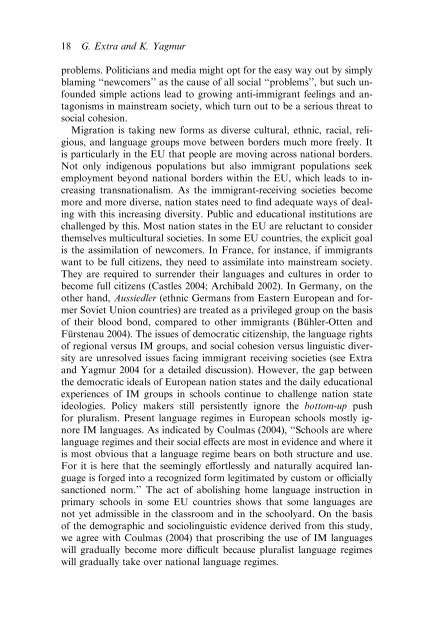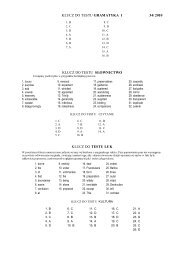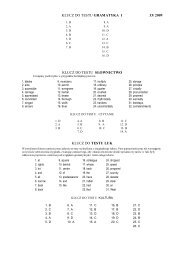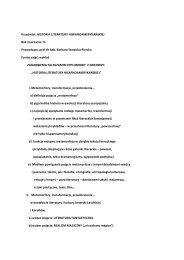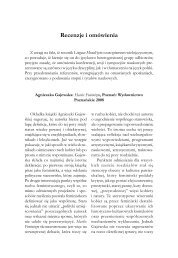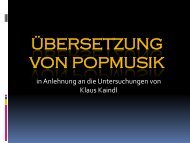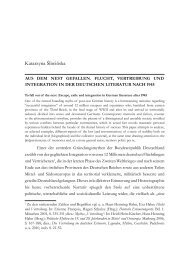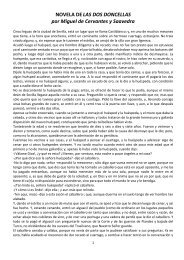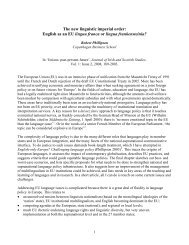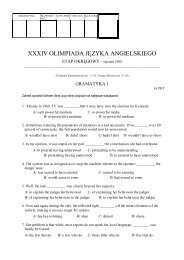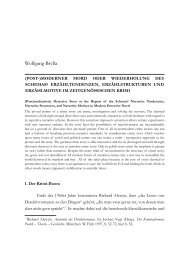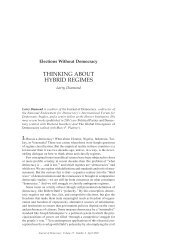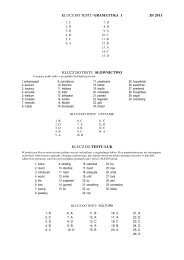R9 EXTRA YAGMUR Emerging multilingualism in urban Europe.pdf
R9 EXTRA YAGMUR Emerging multilingualism in urban Europe.pdf
R9 EXTRA YAGMUR Emerging multilingualism in urban Europe.pdf
You also want an ePaper? Increase the reach of your titles
YUMPU automatically turns print PDFs into web optimized ePapers that Google loves.
18 G. Extra and K. Yagmurproblems. Politicians and media might opt for the easy way out by simplyblam<strong>in</strong>g ‘‘newcomers’’ as the cause of all social ‘‘problems’’, but such unfoundedsimple actions lead to grow<strong>in</strong>g anti-immigrant feel<strong>in</strong>gs and antagonisms<strong>in</strong> ma<strong>in</strong>stream society, which turn out to be a serious threat tosocial cohesion.Migration is tak<strong>in</strong>g new forms as diverse cultural, ethnic, racial, religious,and language groups move between borders much more freely. Itis particularly <strong>in</strong> the EU that people are mov<strong>in</strong>g across national borders.Not only <strong>in</strong>digenous populations but also immigrant populations seekemployment beyond national borders with<strong>in</strong> the EU, which leads to <strong>in</strong>creas<strong>in</strong>gtransnationalism. As the immigrant-receiv<strong>in</strong>g societies becomemore and more diverse, nation states need to f<strong>in</strong>d adequate ways of deal<strong>in</strong>gwith this <strong>in</strong>creas<strong>in</strong>g diversity. Public and educational <strong>in</strong>stitutions arechallenged by this. Most nation states <strong>in</strong> the EU are reluctant to considerthemselves multicultural societies. In some EU countries, the explicit goalis the assimilation of newcomers. In France, for <strong>in</strong>stance, if immigrantswant to be full citizens, they need to assimilate <strong>in</strong>to ma<strong>in</strong>stream society.They are required to surrender their languages and cultures <strong>in</strong> order tobecome full citizens (Castles 2004; Archibald 2002). In Germany, on theother hand, Aussiedler (ethnic Germans from Eastern <strong>Europe</strong>an and formerSoviet Union countries) are treated as a privileged group on the basisof their blood bond, compared to other immigrants (Bühler-Otten andFürstenau 2004). The issues of democratic citizenship, the language rightsof regional versus IM groups, and social cohesion versus l<strong>in</strong>guistic diversityare unresolved issues fac<strong>in</strong>g immigrant receiv<strong>in</strong>g societies (see Extraand Yagmur 2004 for a detailed discussion). However, the gap betweenthe democratic ideals of <strong>Europe</strong>an nation states and the daily educationalexperiences of IM groups <strong>in</strong> schools cont<strong>in</strong>ue to challenge nation stateideologies. Policy makers still persistently ignore the bottom-up pushfor pluralism. Present language regimes <strong>in</strong> <strong>Europe</strong>an schools mostly ignoreIM languages. As <strong>in</strong>dicated by Coulmas (2004), ‘‘Schools are wherelanguage regimes and their social e¤ects are most <strong>in</strong> evidence and where itis most obvious that a language regime bears on both structure and use.For it is here that the seem<strong>in</strong>gly e¤ortlessly and naturally acquired languageis forged <strong>in</strong>to a recognized form legitimated by custom or o‰ciallysanctioned norm.’’ The act of abolish<strong>in</strong>g home language <strong>in</strong>struction <strong>in</strong>primary schools <strong>in</strong> some EU countries shows that some languages arenot yet admissible <strong>in</strong> the classroom and <strong>in</strong> the schoolyard. On the basisof the demographic and sociol<strong>in</strong>guistic evidence derived from this study,we agree with Coulmas (2004) that proscrib<strong>in</strong>g the use of IM languageswill gradually become more di‰cult because pluralist language regimeswill gradually take over national language regimes.


